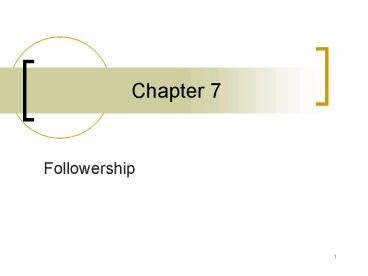Followership PowerPoint PPT Presentation
1 / 14
Title: Followership
1
Chapter 7
- Followership
2
Critical and Uncritical Thinking
- Critical Thinking
- Thinking independently and being mindful of the
effects of ones own and other peoples behavior
on achieving the organizations vision. - Uncritical Thinking
- Failing to consider possibilities beyond what one
is told accepting the leaders ideas without
thinking.
3
Ex. 7.1 Followership Styles
Independent, critical thinking
Alienated
Effective
Pragmatic Survivor
Passive
Active
Passive
Conformist
Dependent, uncritical thinking
4
The effective follower
- The will to assume responsibility
- The will to serve
- The will to challenge
- The will to participate in transformation
- The will to leave
5
Ex. 7.2 The Maturity Continuum
7
Sharpen the Saw
Interdependence
5
6
Seek First to Understand Then to be Understood
Synergize
PUBLIC VICTORY
Think win-win
4
Independence
Put First Things First
3
PRIVATE VICTORY
Begin with the End in Mind
1
2
Be Proactive
Dependence
8. Find your voice and inspire others to find
theirs
6
Sources of Follower Power
- Personal Sources
- Knowledge
- Expertise
- Effort
- Persuasion
- Position Sources
- Location
- Information
- Access
7
Ex. 7.3 Ways to Influence Your Leader
Help the Leader Be a Good Leader Ask for
advice. Tell leader what you think. Find things
to thank leader for.
Be a Resource for the Leader Determine the
leaders needs. Zig where the leader zags. Tell
leader about you. Align self to team
purpose/vision.
View the Leader Realistically Give up idealized
leader images. Dont hide anything. Dont
criticize leader to others. Disagree occasionally.
Build a Relationship Ask about leader at your
level/position. Welcome feedback and
criticism. Ask leader to tell you company
stories.
8
Ex. 7.4 Rank Order of Desirable Characteristics
- Desirable Leaders Are
- Honest
- Forward thinking
- Inspiring
- Competent
- Desirable Colleagues (Followers) Are
- Honest
- Cooperative
- Dependable
- Competent
9
Ex. 7.5 The Feedback Process
- Observation
- Follower misses deadlines repeatedly.
- Development
- Follower given training in self-management, team
allocated work based on personal skills.
- Assessment
- Follower lacks self-management skills.
- Consequences
- Team members resent delays to team projects.
10
Feedback
- Make regular feedback a habit
- Use elements of storytelling
- Be generous with positive feedback
- Train followers to view feedback as an
opportunity for development.
11
Leading others to lead themselves
- Accept and acknowledge your inability to
accomplish anything without the help of followers - Self-management leadership helping others to
help themselves - Followers and leaders are active partners who are
continually learning, growing, and changing - Coach employees, share information
- Directed autonomy
12
Dialogue
A type of communication in which each person
suspends his attachment to a particular viewpoint
so that a deeper level of listening, synthesis,
and meaning evolves from the whole community
13
Characteristics of community
- Inclusivity
- Positive culture
- Conversation
- Caring and trust
- Shared leadership
14
Communities of Practice
Made up of individuals who are informally bound
to one another through exposure to a similar set
of problems and a common pursuit of solutions

